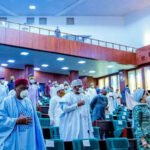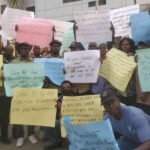The continued delay by the Economic and Financial Crimes Commission (EFCC) in concluding investigations into the alleged fraud involving former Ministers of Humanitarian Affairs, Betta Edu, Sadiya Umar-Farouk, and other officials raises deep concerns about the seriousness of Nigeria’s fight against corruption.
Development Diaries reports that despite over N30 billion reportedly recovered and an interim report submitted to the presidency, no formal charges have been filed more than 15 months later.
It is understood that the EFCC and the Independent Corrupt Practices and Other Related Offences Commission (ICPC) discovered over N30 billion from 50 bank accounts linked to the ministry when Edu and Sadiya held sway there.
According to findings by Daily Trust, the EFCC had not compiled any charge(s) against the officials being probed.
This situation fuels public scepticism and erodes trust in the country’s anti-corruption institutions, especially when similar investigations involving lower-level individuals are often speedily prosecuted.
Moreover, the explanations offered by EFCC officials about the ‘complicated’ nature of the case and the need for thoroughness, while understandable to some extent, cannot justify such prolonged silence.
Prolonged investigations without clear updates or accountability measures send the wrong message, that political connections can shield individuals from facing consequences, further weakening public morale and Nigeria’s international reputation in the anti-corruption space.
The lack of transparency surrounding the status of this high-profile case also emphasizes the need for stronger institutional independence and public oversight mechanisms.
Nigerians deserve regular, factual updates on the status of investigations involving public funds, especially when the alleged fraud involves resources meant for the country’s most vulnerable citizens.
If the EFCC fails to demonstrate that it can hold the powerful accountable without fear or favour, it risks eroding the very trust and legitimacy it relies on to function effectively.
Nigerians must not be made to believe that justice is selective or that the fight against corruption only targets the weak while shielding the politically connected.
Development Diaries therefore calls on the Commission to prioritise transparency, speed up its investigations, and charge those found culpable without further delay. Anything less would amount to a betrayal of public trust and a dangerous encouragement of impunity.
Photo source: Channels TV







